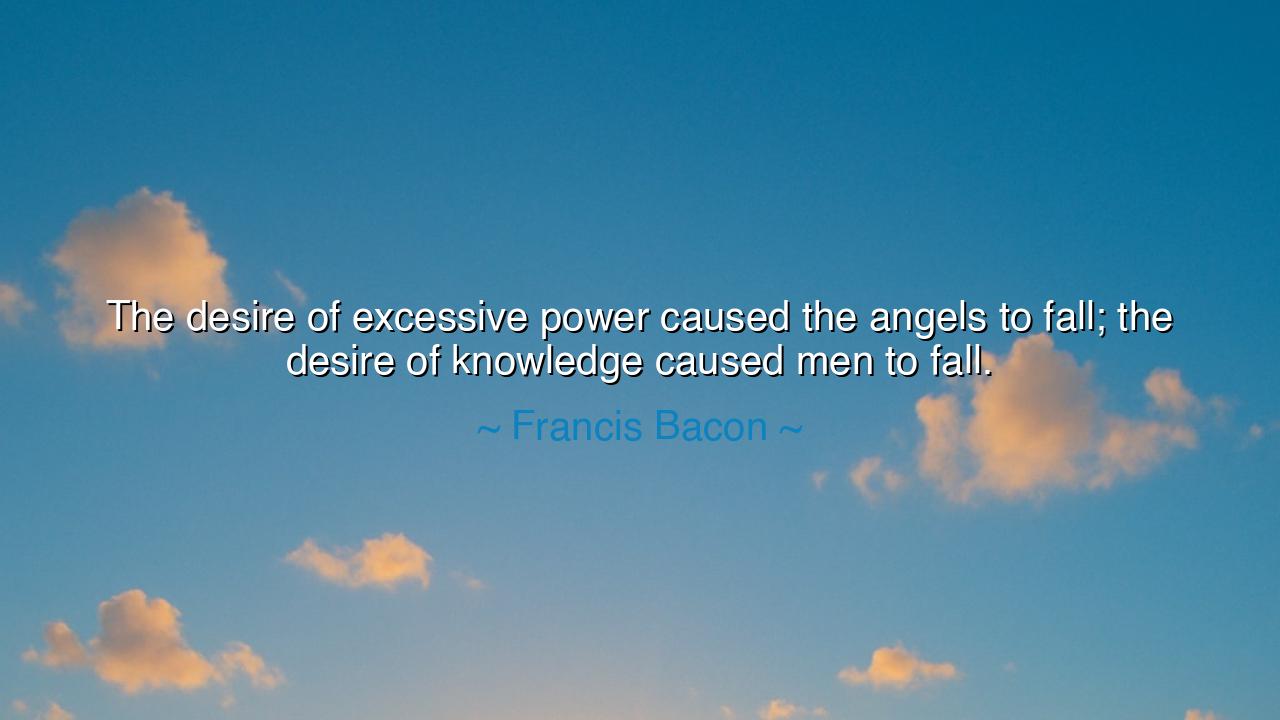
The desire of excessive power caused the angels to fall; the
The desire of excessive power caused the angels to fall; the desire of knowledge caused men to fall.






In the immortal words of Francis Bacon, the great English philosopher and father of the scientific method, we find a warning etched in timeless wisdom: “The desire of excessive power caused the angels to fall; the desire of knowledge caused men to fall.” This statement is both a mirror and a prophecy — a reflection of humanity’s eternal struggle between aspiration and restraint, between divine yearning and mortal limitation. Bacon, who devoted his life to the pursuit of truth, understood that knowledge and power are gifts that can raise man to greatness, but if pursued without humility, can also cast him into ruin.
The origin of this thought lies in two ancient tales — the fall of Lucifer, and the fall of Adam. In sacred tradition, Lucifer, the brightest of angels, sought not to serve but to reign. His desire for excessive power, his pride in his own radiance, led him to challenge the throne of Heaven. And so he fell, not because he lacked light, but because he refused to acknowledge its Source. Likewise, Adam and Eve, our first parents, were tempted not by riches or might, but by the desire for forbidden knowledge — the fruit of the Tree of the Knowledge of Good and Evil. In reaching beyond their appointed bounds, they too fell from grace. Bacon saw in these stories not mere myths, but moral truths: that every fall begins with a noble desire pushed beyond its rightful measure.
For power and knowledge are not evils in themselves — they are divine instruments entrusted to the wise. The danger lies not in their pursuit, but in their excess. When power is sought without justice, it becomes tyranny; when knowledge is sought without reverence, it becomes corruption. Bacon himself, a man of science and reason, was not condemning the quest for understanding, but reminding mankind that curiosity without conscience is perilous. To know the laws of nature is divine; to seek mastery over creation without wisdom is to repeat the sin of Eden — to place the self above the sacred.
History offers us countless reminders of this truth. Consider the story of Robert Oppenheimer, the brilliant physicist who helped unlock the secrets of the atom. His pursuit of knowledge was noble, driven by curiosity and intellect. Yet when that knowledge gave birth to the atomic bomb, and cities were turned to ash, Oppenheimer saw the shadow of his own creation and whispered, “Now I am become Death, the destroyer of worlds.” His story echoes Bacon’s warning — that knowledge without wisdom becomes destruction, and power without restraint becomes damnation. The brilliance that once sought to understand creation had, in its excess, become the architect of devastation.
Bacon’s words also speak to the nature of human ambition itself. The soul of man is ever restless, ever reaching upward, striving to transcend his limits. This yearning, if guided by humility, leads to discovery, to civilization, to beauty. But if ruled by pride, it leads to chaos and despair. The angels fell by trying to ascend above God; man fell by trying to become as God. Both sought to grasp eternity with mortal hands. Thus, Bacon’s insight stands as an eternal law: that wisdom begins not in mastery, but in reverence — not in the power to know all things, but in the wisdom to know one’s place among them.
And yet, there is redemption in this understanding. For to recognize the peril of excess is not to reject greatness, but to sanctify it. The true sage learns that power must serve, not rule, and knowledge must enlighten, not corrupt. To wield either is to walk a narrow path between creation and destruction. Only through humility — through remembering that all light is borrowed from the divine — can man rise without falling. The lesson of the angels and the lesson of Adam are one: that greatness must be tempered by grace.
Therefore, my child of thought, let this wisdom dwell in your heart: seek knowledge, but seek it with humility; pursue power, but use it with mercy. The universe reveals its secrets only to those who revere it, not to those who would conquer it. Stand in awe before truth, and it will guide you. But reach for it in pride, and it will undo you. For as Bacon teaches, the light that lifts us may also burn us — and only the humble heart can bear its flame.






AAdministratorAdministrator
Welcome, honored guests. Please leave a comment, we will respond soon